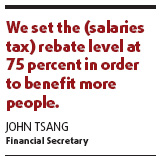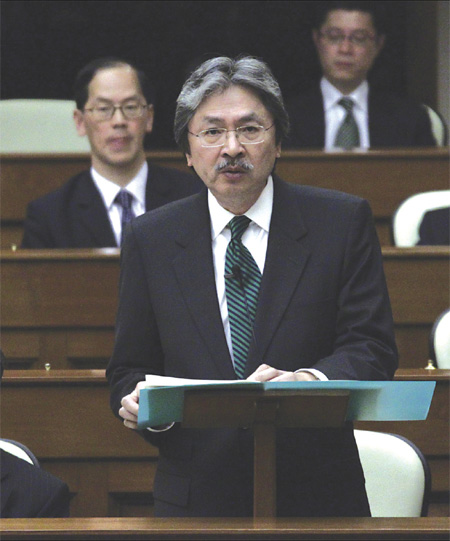Budget allocates HK$20b for public aid programs
Updated: 2010-02-25 07:34
By Joseph Li(HK Edition)
|
|||||||
|
Financial Secretary John Tsang delivers the annual Budget Speech at the Legislative Council yesterday. Edmond Tang |
Themes of renewal, recovery and relief underlie new measures
HONG KONG: Although Financial Secretary John Tsang has projected a deficit in excess of HK$25 billion for 2010-11, in his Budget Speech yesterday, he launched a relief package to benefit people from all walks of life.
The package contains a tax rebate, waiver of public housing rentals, as well as additional allowances for the poor, elderly and disabled. The entire package of relief measures will cost HK$20.4 billion.
Among other things, rates for all four quarters of 2010-11 will be exempt, subject to a ceiling of HK$1,500 per quarter. It will cost the government HK$8.6 billion.
The concession exceeds public expectations, as most people forecast an exemption of no more than three quarters would be offered.

Reducing 75 percent of the 2009-10 salaries tax, subject to a ceiling of HK$6,000, will benefit all the 1.4 million taxpayers and cost the government HK$4.5 billion.
"We set the rebate level at 75 percent in order to benefit more people," Tsang said.
For the benefit of 930,000 businesses, the annual registration fee will be waived and this will cost the government HK$1.8 billion.
On the expenditure side, about 700,000 public housing tenants will be exempt from paying two months' rent and this will cost another HK$1.8 billion.
For the benefits of the poor, old and disabled, a sum equivalent to one month's standard allowance will be disbursed. About 480,000 recipients of social security, 500,000 of old age allowances and 130,000 of disabled allowances will benefit from this exercise that will have a price tag of HK$1.8 billion.
An allowance of HK$1,000 will be provided in the next school year to students in kindergartens, primary and secondary schools and tertiary institutions from families receiving social security or student financial assistance. The proposal will involve an expenditure of about HK$570 million.
To enhance maintenance of aged buildings, Tsang allocated a further HK$500 million to Operation Bright in order to cover more buildings. As for the collapsed building on Ma Tau Wai Road, the Urban Renewal Authority will initiate a redevelopment project in the vicinity immediately.
Wong Hung, associate professor of the Chinese University's Department of Social Work, was not satisfied with the relief measures.
In his view, they are one-off measures with only short-term effects. The budget has not done much in job creation and so people, especially young people with little education and skills, will fall back into the trap of low-paid jobs, he said.
Also, the government is not tackling the aging population problem through the set-up of a city-wide retirement scheme, he said.
Lawmaker Wong Kwok-hing, from the Federation of Trade Unions, was on the whole pleased with the relief package. However, he grumbled about the traffic allowance scheme on the grounds that it was not expanded, with Tsang saying only that it would be reviewed by the end of 2010.
On the other hand, Wong praised the government as decisive in launching the Ma Tau Wai Road redevelopment expeditiously. As people find it hard to buy properties, he suggested resumed construction of a suitable number of home ownership scheme flats and the first-time home starters loan scheme.
(HK Edition 02/25/2010 page1)
